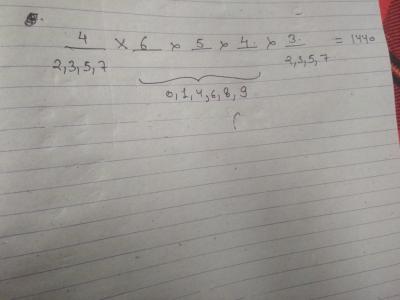How many 5 digit numbers start with a prime number and end with a prime number? Further, no other digit in the number is a prime number. Also, no two digits of the 5 digit number are same .
The center of the coin is at least one coin radius from any grid line.
You can then shade the area of a grid square where the coin center cannot fall -- this shaded area will look the same in every square. If the coin radius is r and the grid square sides have length a, there's a small square of side length a−2r in each square where the center can fall without the coin extending beyond the grid square.
So the probablity of staying within the square becomes
(a-2r)2/a2
putting the given values probability=64/100=16/25
Divisible by 12 means divisible by 3 and 4 both.
to be divisible by 4 last two digits has to be divisble by 4. only combination : 76
_ _ _ _ _ _ _ 76
to be divisble by 3 sum of the digits has to be divisible by 3 .
sum of last two digits = 7 + 6 i.e 13 ( 3k + 1)
so sum of remaining 7 digits should be of the form 3k + 2 .
_ _ _ _ _ _ _
All sevens => sum 49 ( 3k + 1) hence not divisble by 3 .
6 sevens , 1 sixes => sum 48 ( 3k ) not divisble by 3.
5 sevens , 2 sixes => sum 47 ( 3k + 2) divisble by 3.
7777766 => 7!/(5!2!) numbers
4 sevens , 3 sixes => not divisble by 3
3 sevens , 4 sixes => not divisble by 3
2 sevens , 5 sixes => divisble by 3.
6666677 => 7!/(5!2!) numbers
1 seven , 6 sixes => not divisble by 3
all sixes => not divisible by 3
Hence , 2 x 7!/(5!2!) = 42 , 9 digit numbers
Jaune Y = (4 C1)*(5 C 2) = 4*10 = 40
Jaune X = (4 C 2)*(5 C 1) + (4 C 3) = 6*5 + 4 = 34
Total combinations = 9C 3 = 84
Probability of Jaune = (40 + 34)/84 = 37/42
Alternate approach,
If the new colour doesn't contain Blue paint, then it isn't of type Jaune. So, it is much easier to calculate the complementary probability.
P(no Blue paint chosen) = (5/9)*(4/8)*(3/7) = 5/42.
Therefore, the required probability is 1 - 5/42 = 37/42
if we assume that each couples as a one person total 3 person in a row and the probablity of three person, where couples seat together, on five chairs is 3/5.
But the question is asking neither of couples seat together so the opposite way 1-3/5=2/5



